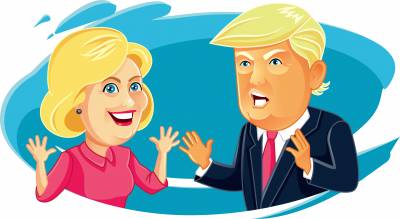
The American election process is a long, complex and byzantine exercise that is very puzzling this year. After an extensive set of primaries, Americans selected two candidates, one from each major party, that are widely disliked. Unlike President Obama, John McCain or Mitt Romney, who were respected, this year’s candidates do not command the same admiration. This is the first puzzle. With so many options to choose from, why did Americans choose these two individuals?
Donald Trump, during this election campaign, has managed to offend women, African Americans, immigrants, Latinos, veterans, gays and lesbians, disabled people and others. Women represent approximately 50% of the US population. African Americans represent 13.2% of the population while Latinos represent 17.2%. Some simple math would suggest that Mr. Trump, the Republican candidate, should be trailing Hillary Clinton, the Democratic candidate, by huge numbers. The fact that they are only separated by a few percentage points in the most recent polls suggests that there is second puzzle. Why are so many women, African Americans, Latinos, veterans, gays and lesbians, disabled people and other groups voting for Trump?
Another element of this election that is quite different from previous elections is that Donald Trump, a representative of the Republican party has expressed views on various issues that are not consistent with Republican values. In fact, his policies on immigration, NATO, trade and other key issues have been at odds with Speaker Ryan, Senate Majority Leader McConnell and other Republican leaders. Moreover, Trump’s business practices (i.e. Trump University, not allowing African Americans to move into his buildings) have also raised major questions about Mr. Trump’s suitability for office. Many Republican officials and leaders have not endorsed Donald Trump or actually distanced themselves from him. This is a third puzzle of this election year. Why are so many Republican voters, who support some of the more traditional Republican policies, supporting this candidate this year.
The answer seems to be as follows. Hillary Clinton is not well liked. She is viewed as secretive and possibly a bit devious when it comes to the use of a private e mail server for government communication purposes; questions remain about her independence when it comes to her family Foundation that has ties to key people and groups around the world. But these concerns hardly explain how a few days before the election, the polls are so tight. To solve these puzzles requires a closer look at the structure of the states, demographics and the nature of American political beliefs and values.
While America has 50 states, the voting preferences in 41 of the states don’t change much from one election to another. Despite all the speeches, the three televised debates (which most opinion polls suggest were won by Hillary Clinton), the disclosure of the now famous Access Hollywood video in which Donald Trump makes some very lewd remarks about women, his non-traditional Republican views on some issues and his questionable business practices, Americans in these states seem to be able to differentiate Donald Trump the person from Donald Trump, the leader of the Republican party. In my conversations with a number of Trump supporters over the past six months, they are able to quickly get past Trump’s negative personal qualities and focus on what they call President Obama’s failed policies, the Democrats’ policies in such areas as abortion, health care and the economy and the need for a “change” (the magic word) in Washington. They look at Trump as their opportunity to break the gridlock and appoint an outsider who will get something done that is good for working class Americans. This is a huge leap of faith for a person who has shown himself to be very erratic and has such questionable values and ethics.
Needless to say, many people are very uneasy about the possibility of a Trump presidency. He has raised some very important questions about the value of free trade, the alliance with NATO, manufacturing jobs, undocumented immigrants, and a range of other issues, some legitimate and some not. The thought that America can raise tariffs on some goods as a method of bringing back American jobs in some industries is very questionable. The idea of building a wall between Mexico and the United States (and expecting Mexico to pay for it) is also a very questionable way of dealing with undocumented immigrants.
Hillary Clinton is a flawed candidate but she is very experienced and competent in world affairs and US domestic issues. She has a great grasp of the issues and is much more likely to have a positive impact on both the United States and the world in the years ahead. November 8 cannot come soon enough.



















